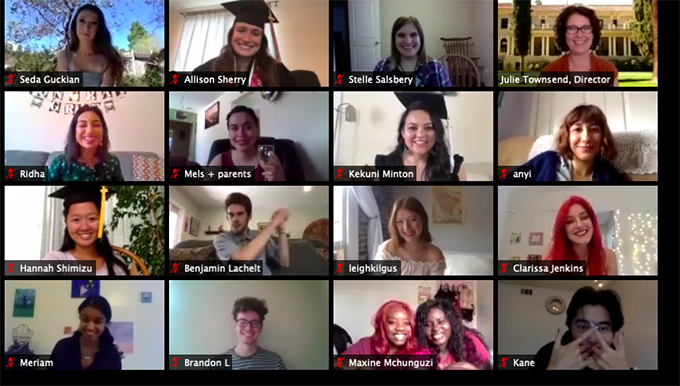Two weeks before the University of Redlands students left campus, the Johnston class of 2020 finished their “senior meetings,” a series of discussions on Monday afternoons in Bekins Hall to plan their graduation celebrations. Ideas were shared, arguments made, and agreements were built through consensus. Those details included selecting their commencement speaker, Professor Keith Osajima, director of Race and Ethnic Studies; asking alumni Adam Ghovayzi ’12 and Ilana Ludovico ’17 to emcee the ceremony; recruiting a classmate to design the cover art for the graduation program; and scouting the location of their faculty-senior dinner. With the event planning details finalized by March 2, Johnston actually was in good shape going into graduation season.
But you know the rest of this story. The COVID-19 pandemic hit. The University of Redlands’ official Commencement 2020 ceremonies were postponed until the fall. Students packed up their lives, and the Class of 2020 left campus without saying goodbye. Feelings of loss, sadness, hurt, fear and anger flooded the halls of Johnston Complex. I recall one senior saying, “Of course this is happening to our class!” Remember, this is the class that entered college during the contentious 2016 election.
The Director of the Johnston Center for Integrative Studies, Professor Julie Townsend, then stepped up to the challenge and proposed a “Johnston Community Graduation Celebration” for the seniors via video conference. Townsend received a resounding yes from Johnston faculty and staff, and the team got to work. Resident Director Maggie Ruopp ’16 tracked down seniors to confirm participation. Department Coordinator Kerry Robles fielded emails. Johnston Registrar Joselyn Gaytan, along with Robles, worked on the digital program. Townsend penned her opening remarks. Professor Tim Seiber selected pre-ceremony music, and Professor Kelly Hankin wrote a toast.
As assistant director of the Johnston Center for Integrative Studies, I worked with Townsend and reached out to guests the seniors invited to be in the ceremony—Osajima, Ghovayzi, and Ludovico. All enthusiastically accepted the technological celebratory experiment to fulfill their roles during the online ceremony. Sixteen Johnston seniors confirmed their intentions to participate.
On April 18, Townsend welcomed attendees with the “Quaker shake,” a quiet hand-signal to show agreement. A Johnston favorite, Townsend recommended using it in lieu of claps and cheers in the video conferencing platform. Osajima’s graduation address set a joyful and introspective tone for the ceremony. He opened his speech with two different drafts written pre- and post-closure of campus. The contrast brought humor to the forefront, followed closely by a deep, heartfelt reflection on the characteristics of the Johnston Class of 2020.
Osajima said, “I have seen firsthand how deeply committed and passionate you are about issues of social justice. You have been an activist force, challenging us to think better and act more effectively around issues of racism, gender identity, sexism and transgender rights. Your ability to think and bring about social change will be much needed as we move forward. We already know that the virus is taking a big toll on poor people, on black and brown people, and on people who are homeless. The virus has exposed the deep flaws in our health care system, in our profit-driven economy, and in our government’s ability to respond. Some will want to return to business as usual, but here’s where your commitment to justice will be much needed, or in today’s terms, essential. Your ideas and your voices can help shape a post-COVID world that is more just and humane.”
Ghovayzi and Ludovico gracefully carried the ceremony from there, introducing each graduate and their presenters with respect and love. Most graduates preselected their presenters: From family members to friends to Johnston staff, people spoke on their student’s behalf through song, spoken-word, or poetry. Unique to this ceremony, the graduates responded to their presenters, shared words of gratitude, humor, and even hope. Quaker shakes abounded in gallery view with the smiling faces of graduates, their loved ones, and faculty and staff from across the College.
At one point, Ghovayzi — who was Johnston’s residence director from 2013 to 2018— took a moment to acknowledge Townsend’s esteemed directorship. Ghovayzi said, “As Julie will be stepping away from the directorship of Johnston, let’s take a quick moment to recognize all of the many documents signed, events planned, fires smothered, and lives irrevocably changed. Thanks Julie, you’ve been an exemplary model for us all and we are, all of us, better for it.”
Johnston Community Coordinator Melissa Olvera ’20 offered a land acknowledgement and words of gratitude. The event concluded with a witty toast by Kelly Hankin.
I often tell students their Johnston educations are as individualized from the beginning until the very end. They decide the emphasis titles of their bachelor degrees; who will present them at graduation; who will address the audience of their family and friends. The range of presenters and the creativity in how they use their two minutes of time to introduce their graduate is as wide and diverse as their degree titles themselves. But I wondered: Would Johnston’s creativity translate over the screen?
When graduate Anyi Guzman’s brother sang a sweet song and strummed the ukulele early in the ceremony, it was clear the magic of this program was still alive. Virtually together, socially distanced and all, attendees witnessed members of a smart, resilient, interesting, and quirky cohort saying goodbye in harmony.
Watch the virtual 2020 graduation celebration or learn more about studying at the Johnston Center for Integrative Studies.






